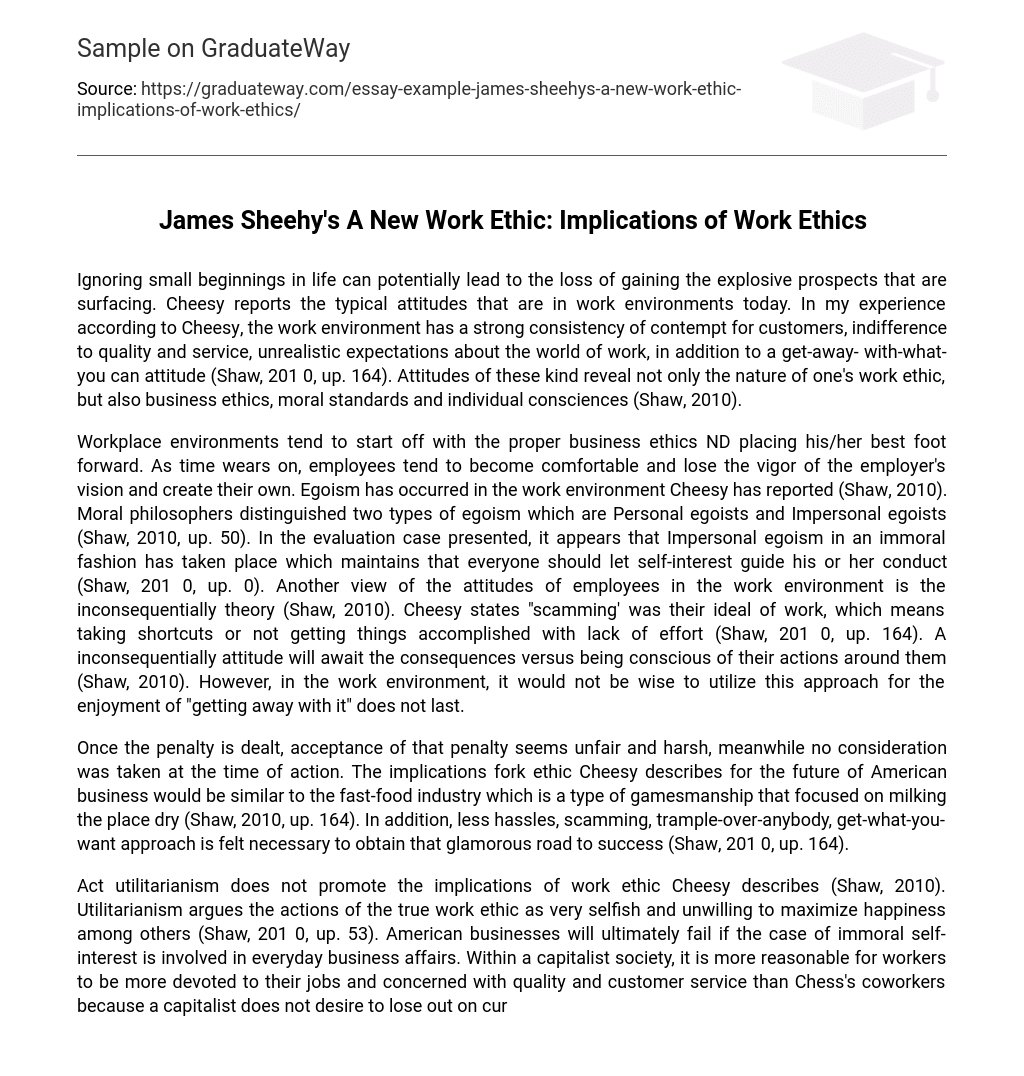Ignoring small beginnings in life can potentially lead to the loss of gaining the explosive prospects that are surfacing. Cheesy reports the typical attitudes that are in work environments today. In my experience according to Cheesy, the work environment has a strong consistency of contempt for customers, indifference to quality and service, unrealistic expectations about the world of work, in addition to a get-away- with-what-you can attitude (Shaw, 201 0, up. 164). Attitudes of these kind reveal not only the nature of one’s work ethic, but also business ethics, moral standards and individual consciences (Shaw, 2010).
Workplace environments tend to start off with the proper business ethics ND placing his/her best foot forward. As time wears on, employees tend to become comfortable and lose the vigor of the employer’s vision and create their own. Egoism has occurred in the work environment Cheesy has reported (Shaw, 2010). Moral philosophers distinguished two types of egoism which are Personal egoists and Impersonal egoists (Shaw, 2010, up. 50). In the evaluation case presented, it appears that Impersonal egoism in an immoral fashion has taken place which maintains that everyone should let self-interest guide his or her conduct (Shaw, 201 0, up. 0). Another view of the attitudes of employees in the work environment is the inconsequentially theory (Shaw, 2010). Cheesy states “scamming’ was their ideal of work, which means taking shortcuts or not getting things accomplished with lack of effort (Shaw, 201 0, up. 164). A inconsequentially attitude will await the consequences versus being conscious of their actions around them (Shaw, 2010). However, in the work environment, it would not be wise to utilize this approach for the enjoyment of “getting away with it” does not last.
Once the penalty is dealt, acceptance of that penalty seems unfair and harsh, meanwhile no consideration was taken at the time of action. The implications fork ethic Cheesy describes for the future of American business would be similar to the fast-food industry which is a type of gamesmanship that focused on milking the place dry (Shaw, 2010, up. 164). In addition, less hassles, scamming, trample-over-anybody, get-what-you-want approach is felt necessary to obtain that glamorous road to success (Shaw, 201 0, up. 164).
Act utilitarianism does not promote the implications of work ethic Cheesy describes (Shaw, 2010). Utilitarianism argues the actions of the true work ethic as very selfish and unwilling to maximize happiness among others (Shaw, 201 0, up. 53). American businesses will ultimately fail if the case of immoral self-interest is involved in everyday business affairs. Within a capitalist society, it is more reasonable for workers to be more devoted to their jobs and concerned with quality and customer service than Chess’s coworkers because a capitalist does not desire to lose out on current and future revenues.
According to Adam Smith, each individual’s results in pursuit of wealth is guided by an invisible hand (Shaw, 201 0, up. 140). Although a capitalist utilizes self-interest, they also have to ensure to maintain what is required to produce the most efficient and productive economic system (Shaw, 2010). In order for a capitalist to become successful and keep up with quality and customer service, a profit motive is suggested (Shaw, 2010). A profit motive could be viewed as self-interest alone; however, within self-interest lies a motivation of retaining and earning clientele (Shaw, 2010).
Competition also holds a major factor in job devotion and quality customer service (Shaw, 2010). Moral actions such as avoidance of price gouging (scamming), or employee exploitation will keep a capitalist from becoming beaten out by a competitor as well as uphold integrity (Shaw, 201 0, up. 137). Employee theft runs rampant within all organizations. As Cheesy reported, younger employees were subject to peer pressure to steal as a way to become part of the group, to feel wanted and popular (Shaw, 2010, up. 164).
Such behavior can be equated with Corrupting (Shaw, 2010). It is known that Corrupting leads to irrational, sometimes disastrous decisions and has enormous potential for doing moral damage (Shaw, 201 0, up. 28). Another reasoning behind employee theft can stem from moral standards and principles (Shaw, 2010). Things we accept such as our early upbringing, behaviors of those around us, the explicit and implicit standards of our culture, our experiences, and our critical reflections on those experiences can trigger employee theft (Shaw, 201 0, up. 4). Some employee theft can stem from job dissatisfaction, lack of pay and anger/retaliation against management. Although we attempt to provide the benefit of the doubt why employee theft occurs, that still does not stop the consequences of employer’s rules and legalities to go forward. Culture of our capitalist society encourages attitudes similar to what Cheesy describes would be the example of Firestone. Firestone was exposed for a media misrepresentation that was left uncorrected (Shaw, 2010, up. 36). When Firestone officials were questioned why the error wasn’t corrected, it was stated that it was not beneficial for the company to make the correction (Shaw, 2010, up. 136). This is an example of what can benefit a single entity versus an entire group. Cheesy describes the attitude of one person benefiting versus an entire group by each of the students taking longer time o complete assigned tasks in order to avoid additional assignments. (Shaw, 2010, up. 164).
Economic inequality and the disparity in personal incomes can be a factor in encouragement of workplace attitudes similar to what Cheesy has described (Shaw, 2010). Divisions of social and economic class also bring inequality of unequal opportunity (Shaw, 2010, up. 142). Individuals cannot help what type of system they are born into. Once a sense of responsibility arises, it is criticized that one should know how to assume responsibility and not swindle the system. Capitalism has placed a level of blindness upon those whom feel inferior economically.





